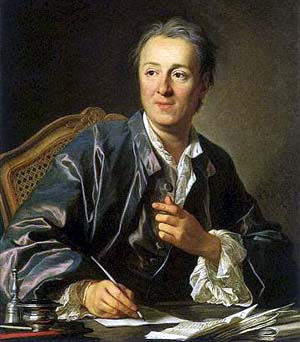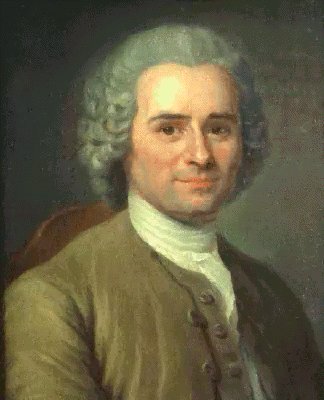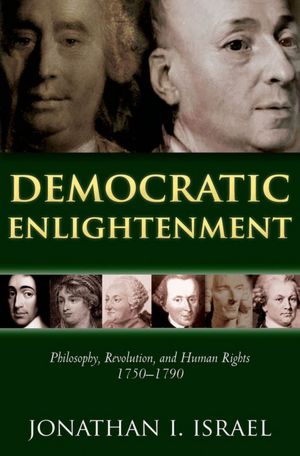March 6, 2012
Democratic Enlightenment: Philosophy, Revolution, and Human Rights, 1750-1790 by Jonathan I. Israel. Oxford University Press, 1066 pages, $45.
By George Scialabba
Historians are generally spoilsports, eager to explain that nothing ever happened for the first time, or was uniquely important, or was the cause of anything else, except indirectly and with so many other contributory causes that the effect would probably have occurred anyway. Small claims, punctiliously qualified --- this seems to be their game. I suppose it's fun, once you've learned to play.
Jonathan Israel is playing a different game. The Enlightenment, he boldly affirms, is a pivotal event in Western history and undoubtedly "one of the most important shifts in the history of man." The Renaissance and Reformation, though they were indeed "vast and fundamental changes," were limited to western and central Europe and were "really only adjustments, modifications, to what was essentially still a theologically concerned and ordered regional society, based on hierarchy and ecclesiastical authority, not universality and equality."
The Enlightenment aspired to, and achieved, something more: "The
Enlightenment --- European and global --- not only attacked and severed
the roots of traditional European culture in the sacred, magic,
kingship, and hierarchy, secularizing all institutions, but
(intellectually and to a degree in practice) effectively demolished all
legitimation of monarchy, aristocracy, woman's subordination to man,
ecclesiastical authority, and slavery, replacing these with the
principles of universality, equality, and democracy."
Commensurate with the Enlightenment's importance, Israel has written a monumental, three-volume history, approximately 2,500 pages long, not including three lengthy bibliographies. His erudition is fabulous; his range is dizzying. Ecclesiastical pronouncements, legal edicts, government reports, philosophical and theological treatises, correspondence, memoirs, periodicals, and serried ranks of secondary scholarly sources are summoned in evidence. Israel is not a vivid or witty writer, but he is an exceptionally clear one, and throughout this immense text he maintains an extraordinary sense of forward motion. What's more, behind and through his meticulously detailed account shines an impassioned, though not obtrusive, admiration for the brave little band who fought and won these early battles for intellectual freedom along with indignation for those who persecuted them. It is at once a stirring and a magisterial book.
The volumes are broadly chronological, but in each of them the narrative is organized around three large themes or arguments. First, the Enlightenment was an international phenomenon. This may seem too obvious to need saying, but historical revisionism has been at work in recent decades, trying to undermine the master narrative of a unitary and cosmopolitan Enlightenment and substitute plural narratives of diverse local and national movements. Israel thinks this tendency has gone too far and shows in abundant detail that the volume of intellectual traffic among European countries, and between Europe and its colonies, was very heavy. Bishops and theologians in Brazil and Quebec watched anxiously over their flocks, hurling anathemas not only at the Parisian philosophes but also at their local sympathizers. Likewise writers, publishers, and curious noblemen and merchants traveled throughout Europe in pursuit of lumieres, bringing news of fresh thinking from the provinces to the metropolis as well as back from it. There was, to a remarkable degree, a single ferment, a common conversation, focused on a shared set of problems and concerns, rather than, as some recent historians have suggested, a collection of national Enlightenments.
Israel's second main theme is the divisions within the Enlightenment, not along geographical lines but along ideological ones. It is commonplace to lump together Voltaire, Diderot, D'Alembert, Rousseau, Holbach, Helvetius, Condorcet, Gibbon, Hume, Adam Smith, Lessing, and Kant as representatives of "the Enlightenment," with Descartes, Hobbes, Locke, Spinoza, Bayle, and Montesquieu as their common seventeenth- and early eighteenth-century predecessors. A reasonable first approximation, perhaps, but it is long past time, Israel argues, for a second approximation. All the philosophes rejected supernatural religion, including miracles, Heaven and Hell, the inerrancy of Scripture, and the authority of the Church; likewise, all rejected slavery, serfdom, the divine right of kings, and the vast, rotting structure of aristocratic privileges.
But this left much room for disagreement, and the disagreements tended to be consistent across religion and politics. Moderates thought there might still be a First Cause, an Intelligent Designer, who created the world, even if He did not interfere in it thereafter; that even if humans did not possess an immortal soul, they had a mind that was not part of the body but a fundamentally different substance; that existing authorities and traditional hierarchies were owed at least a modicum of deference; and that the great majority of people were incorrigibly ignorant and irrational, incapable of enlightened behavior or belief for at least the foreseeable future. Moderates --- including Locke, Montesquieu, Voltaire, D'Alembert, Gibbon, Adam Smith, and Kant --- tended to be believers in Deism and enlightened despotism. They were reformists and gradualists, almost as anxious about change coming too fast as about its not coming at all. (With their trust in enlightened rulers and skepticism about popular self-rule, the moderates strikingly resemble American liberals, in particular The New Republic from the Progressive Era until today.)

By contrast, the radicals -- Israel's heroes -- were all-out atheists, materialists, and democrats. They rejected creation and a supreme being in any form. They asserted that mind and body are one substance. They insisted on subjecting all claims of political or moral authority to criticism, demanding in particular that they be shown to further the welfare of those over whom authority was claimed. And they argued that no matter how benighted and superstitious most people were, they could be trusted to govern themselves and would learn to do so readily if allowed to. The best-known of the radicals were Holbach, Helvetius, and above all Diderot, who emerges as the most attractive figure in the whole of Israel's crowded gallery.
Some readers may ask, how do Rousseau and Hume --- two of the most notable figures of the age, after all --- fit into Israel's scheme? The answer is with some difficulty. Hume was something of an anomaly. A radical skeptic in religion and philosophy, he was too intelligent to respect (as Burke did) the claims of monarchy and aristocracy; but he had even less respect for a populace foolish enough to be bamboozled by kings and priests. He took a very long view --- he seems, for better and worse, the most imperturbable of great thinkers --- and simply wanted a quiet life.
Rousseau was more than an anomaly; he was an enigma. Before the mid-1750s, he was a charter member of the philosophic milieu: a rationalist, religious skeptic, foe of ecclesiastical and aristocratic tyranny, close friend of Diderot. But a combination of obscure compulsions and genuine inspirations led him to break with everyone, radicals and moderates alike. He got religion: not the old supernatural kind (though he did start invoking Divine Providence and railing against atheists) but a new civic religion. The new church was the political community to which all (male) citizens belonged equally and to which all owed unreasoning devotion rather than the individualistic, reason-based criticism of the philosophic citizen. Reason was much inferior to patriotic sentiment and communal loyalty as a guide to virtue. The primitive democracy of Sparta and Republican Rome, fiercely martial and patriarchal, was superior to egalitarian universalism and the "rights of man." Rousseauism was a mish-mash, and as understood and enforced by the Jacobins, it proved deadly.
Israel's third and largest theme is the relation of ideas to events. This is a hardy perennial of historical writing but nowhere more central than in the interpretation of the French Revolution. Because America has been Number One for so long, the American Revolution may seem, in hindsight, more important than the French. But back then, France was Number One: in 1789 no fewer than 50 French cities were larger than the largest American city. For contemporaries, the convulsion in France dwarfed the guerrilla action in America.
Virtually everyone at the time and long afterward laid primary responsibility for the Revolution at the feet of la philosophie moderne. Indeed, as Israel shows, throughout the eighteenth century, the defenders of the old order warned incessantly that exactly this terrible fate awaited Europe if the new ideas were not vigorously suppressed. To friends and enemies, the events of 1789 seemed unquestionably a revolution of the mind. But as each subsequent, new historical approach came on the scene--social history, economic history, the history of mentalités, of cultural diffusion and reception --- each took a crack at revising the accepted interpretation of the Revolution.
"The bourgeoisie was rising"; "particular sectors in the population had become economically or socially more influential during the course of the eighteenth century"; "slow-moving cultural processes had changed basic assumptions"; or, more simply, a muddle of "accident, improvisation, misunderstanding, and self-interest" --- these and other revisionist formulations do have a certain force. But, Israel argues, they only explain why something happened, not why the Revolution happened.
If one wishes to know why the ancien regime monarchy broke down in 1789, the answer certainly lies principally in France's strategic and financial problems. By 1787, desperate and on the verge of collapse, the French court found itself without the resources to support the role that it had always aspired to play in recent centuries in international, maritime, and colonial affairs. . . . France's elites were willing enough to surrender, or rather exchange, some of their privileges and immunities--provided they remained privileged elites, with their legal and honorific status confirmed, and provided that in return, they shared more directly henceforth, politically and administratively, in the exercise of royal power. A gravely weakened nominal monarchy was by 1788 on the verge of being reactivated as an aristocratic state.
But if we ask how and why this attempted political reorganization rapidly shifted from a program of fiscal and political reform designed to recast the dominance of three entrenched, privileged elites --- nobility, clergy, and judiciary --- into a drive to emasculate the crown and obliterate these elites, substituting for ancien regime France a unitary state based on the principal of equality, universal human rights, and democracy underpinned by freedom of thought, expression and the press, then the issue is quite different. There is only one major formative factor and only one cogent answer --- the Radical Enlightenment; everything else is entirely secondary.

It is not that France became a nation of philosophes; as Israel acknowledges, the vast majority were untouched by radical ideas (or, for that matter, conservative ones). The Revolution was a popular revolution but not a revolution from below. There were, politically, masses in motion on a scale never before seen, both for and against the Revolution, but they were set in motion by elites. The Radical Enlightenment, though genuinely egalitarian, democratic, and universalist, was not a mass movement and did not have mass support. In some ways, the promulgation of the Declaration of the Rights of Man and the Citizen in 1789 was its high point. The Jacobin Terror, the Napoleonic Empire, and the Bourbon Restoration were all defeats for Radical Enlightenment --- as indeed was all subsequent history, with a few shining exceptions, such as the Universal Declaration of Human Rights in 1948.
Championing a noble but defeated cause makes a powerful claim on the reader's sympathy. But perhaps the Radical Enlightenment is not permanently defeated. On the last page of this magnificent trilogy, having conducted us on a lengthy tour of the eighteenth century, Israel brings his story up to date with a stoical, austerely beautiful paragraph:
A process was set in train in the late eighteenth century, a democratic enlightenment based on liberty, equality, and the "general good," which was then arrested by kings, aristocracy, and Robespierre's Counter-Enlightenment and driven back, but which resumed in a fashion in the post-Second World War era. Many scholars argue that at the end of the eighteenth century the hopes of the enlighteners were blighted by the contradictions within the Enlightenment. Another way of looking at the Radical Enlightenment's defeat is to see it as a temporary and partial setback mainly due to the power of Counter-Enlightenment, faith, and vested interests. In 1789, it seemed to be possible to drive a powerful wedge between the conservatism of ignorance and the conservatism of landownership and money so that the two no longer mutually reinforce each other. It did not happen. But in response to today's fundamentalism, anti-secularism, Neo-Burkeanism, Postmodernism, and blatant unwillingness to clamp down on powerful vested interests, it is at least conceivable that the universalism and social democracy of radical thought might advance again and this time drive the wedge home harder. There are few grounds for optimism. Yet, it is intriguing to think that the program of the radical philosophes could perhaps be completed yet.
George Scialabba is an editor of The Baffler and the author of What Are Intellectuals Good For? and The Modern Predicament.
